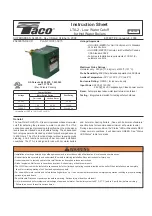
31
Failure to observe the requirements of VDI Guideline
2035 can result in damaging limescale deposits. In
such cases, the service life of the installed boilers will,
most often, already have been reduced. Removing the
limescale deposits is one option for restoring opera-
tional viability.
This measure must be carried out by a qualified con-
tractor. Inspect the heating system for possible dam-
age prior to returning it into use. It is essential that
incorrect operating parameters are corrected to pre-
vent renewed excessive scaling.
Prevention of damage due to corrosion on the water side
The corrosion resistance of ferrous materials on the
heating water side of heating systems and heat gener-
ators depends on the absence of oxygen in the heating
water. The oxygen introduced into the heating system
with the first fill and subsequent top-ups reacts with the
system materials without causing damage.
The characteristic blackening of the water after a cer-
tain time in operation indicates that there is no more
free oxygen present. In accordance with the technical
rules and in particular VDI Guideline 2035-2, we rec-
ommend that the heating system is designed and
operated so that a constant ingress of oxygen into the
heating water is prevented.
During operation, oxygen can enter due to:
■
Open vented expansion vessels with flow through
■
Negative pressure in the system
■
Permeable components
Correctly sized sealed unvented systems operating at
the correct pressure, e.g. systems with expansion ves-
sel, offer good protection against the ingress of air-
borne oxygen. Under all operating conditions and at all
points in the heating system, including the intake side
of the pump, the pressure must be higher than atmos-
pheric pressure. Check the pre-charge pressure of the
expansion vessel at least during the annual service.
Avoid the use of permeable components, e.g. permea-
ble plastic pipes in underfloor heating systems. Pro-
vide system separation if such components are never-
theless used. This system separation must separate
the water flowing through the plastic pipes from other
heating circuits, e.g. from the boiler, by the provision of
a corrosion resistant heat exchanger.
No further anti-corrosion measures are required for
sealed unvented hot water heating systems, subject to
the above points being observed. However, take addi-
tional precautions where there is a risk of oxygen
ingress, for example by adding oxygen binder sodium
sulphite (5 to 10 mg/l into the excess). The pH value of
the heating water should be between 8.2 and 9.5.
Different conditions apply to systems that contain alu-
minium components.
Where chemicals are used as part of the corrosion
protection, we recommend that the manufacturer of the
chemicals issues a certificate of suitability of the addi-
tives with regard to the boiler materials and the materi-
als of other components. Please refer questions
regarding water treatment to an appropriate contractor.
Further details can be found in VDI Guideline 2035-2
and EN 14868.
Water quality
Water quality requirements
(cont.)
5692820
Appendix
Summary of Contents for VITORADIAL 300-T Type VR3
Page 38: ...38 5692820...
Page 39: ...39 5692820...










































